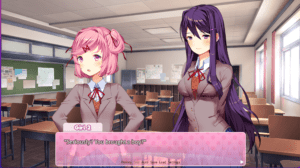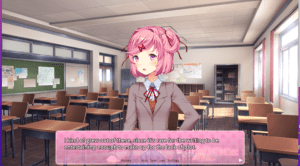

For this week’s critical play, I played Doki Doki Literature Club. I only played this game for about an hour, so I did not get through the entire plot, but I did receive a quick summary and learned that the story gets much more intense than what I experienced in my own critical play.
This game’s narrative is centered on four female characters that upon first glance are the classic overly feminine/sexualized anime women. I think that this game is particularly interesting to look at in light of feminism because as the player, you are a high school boy (which I did not realize until a fair bit into the narrative). As a woman playing this game that didn’t really have any idea of what the game was about until yesterday, this was a little jarring for me in the sense that I did not feel like the target audience for the game. Instead, because the game was set up in a first person POV which increase the self-insert characteristics of the game, it felt as if the target audience of this game is a lonely, nerdy boy who is very into anime. Upon learning more about the plot of the story, this does not seem to be so much the case.
One thing that this game forced me as a player to deal with was the idea of autonomy. There was very little that I, as the player, was able to do/control. Rather, the gameplay mostly consisted of tapping through an already constructed narrative. The feelings of control are even further revoked once it is realized in the plot that Monika is technically pulling the strings behind every interaction having hijacked the game. Even the little autonomy that the player can utilize through picking words to create a poem to lean toward the preferences of different girls is meaningless as the overarching plot will conclude in the same way. The player has no control over the outcome of the game.
I think feminist ideas are explored through the the plot and the absence of player autonomy. Though this is a somewhat famous game now, when it first dropped, I would assume that the major plot twist was not known early on. Therefore, the game would have attracted the desired audience of men who are very into the anime art style and its hyper-sexualization of women wanted to explore some sort of dating plot. Through the absence of autonomy, it forces the player to interact with a world in which their choices have very little impact within a system that is set up for them to fail. This would parallel feminism through an intense/exaggerated immersion into female experience in a world/society that upholds systems that oppress women and minorities.



